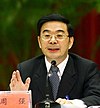President of the Supreme People's Court
From Wikipedia, the free encyclopedia
The president of the Supreme People's Court is the head of the Supreme People's Court and is the highest-ranking official in the Chinese judiciary.
| President of the Supreme People's Court of the People's Republic of China | |
|---|---|
| 中华人民共和国最高人民法院院长 | |
 Emblem of the Supreme People's Court | |
| Supreme People's Court | |
| Status | Deputy national-level official |
| Member of | Supreme People's Court |
| Reports to | National People's Congress and its Standing Committee |
| Seat | Beijing |
| Nominator | Presidium of the National People's Congress |
| Appointer | National People's Congress |
| Term length | Five years, renewable once consecutively |
| Constituting instrument | Constitution of China |
| Formation | 1 October 1949 |
| First holder | Shen Junru |
| Deputy | Vice President of the Supreme People's Court |
| Website | www |
| President of the Supreme People's Court | |||||||
|---|---|---|---|---|---|---|---|
| Simplified Chinese | 中华人民共和国最高人民法院院长 | ||||||
| Traditional Chinese | 中華人民共和國最高人民法院院長 | ||||||
| |||||||
| Chief Justice of the People's Republic of China | |||||||
| Simplified Chinese | 中华人民共和国首席大法官 | ||||||
| Traditional Chinese | 中華人民共和國首席大法官 | ||||||
| |||||||
Under the current constitution, the president of the SPC is appointed by and serves at the pleasure of the National People's Congress (NPC), the legislature. The president also serves ex officio as the chief justice of the People's Republic of China. The incumbent president of the Supreme People's Court is Zhang Jun, who took office on 11 March 2023.
History
The Supreme People's Court of the Central People's Government was established on 1 October 1949. Shen Junru served as the first president by the first plenary session of the Chinese People's Political Consultative Conference.[1]
On 27 September 1954, the SPC of the Central People's Government was replaced with the SPC of the People's Republic of China.[citation needed]
Selection
According to the Organic Law of the National People's Congress (NPC), constitutionally China's highest organ of state power, the president is nominated by the NPC Presidium, the Congress's executive organ.[2] However, the nomination is effectively made by the Chinese Communist Party, with the decisions being made among Party leaders.[3] Although the Presidium could theoretically nominate multiple candidates for the presidency, leading the election to be competitive, it has always nominated a single candidate for the office.[3]
After the nomination, the president is elected by the NPC, which also has the power to remove the president and other state officers from office. Elections and removals are decided by majority vote.[4] The length of the president's term of office is the same as the NPC, which is 5 years, and the president is restricted to two consecutive terms.[4] Since 2018, the president is required to recite the constitutional oath of office before assuming office.[3]
Powers
According to the Judges Law of the People's Republic of China, the president of the SPC is the chief justice of the People's Republic of China.[5]
List of presidents
| No. | Chairperson | NPC term | Took office | Left office | Political Party | |
|---|---|---|---|---|---|---|
| President of the Supreme People's Court of the Central People's Government | ||||||
| 1 |  |
Shen Junru 沈钧儒 |
N/A | October 1, 1949 | September 27, 1954 | China Democratic League (CDL) |
| President of the Supreme People's Court of the People's Republic of China | ||||||
| 2 |  |
Dong Biwu 董必武 |
1st | September 27, 1954 | April 27, 1959 | Chinese Communist Party (CCP) |
| 3 |  |
Xie Juezai 谢觉哉 |
2nd | April 27, 1959 | January 3, 1965 | |
| 4 |  |
Yang Xiufeng 杨秀峰 |
3rd | January 3, 1965 | January 20, 1975 | |
| 5 | Jiang Hua 江华 |
4th | January 20, 1975 | March 5, 1978 | ||
| 5th | March 5, 1978 | June 20, 1983 | ||||
| 6 | Zheng Tianxiang 郑天翔 |
6th | June 20, 1983 | April 9, 1988 | ||
| 7 | Ren Jianxin 任建新 |
7th | April 9, 1988 | March 28, 1993 | ||
| 8th | March 28, 1993 | March 17, 1998 | ||||
| 8 | Xiao Yang 肖扬 |
9th | March 17, 1998 | March 16, 2003 | ||
| 10th | March 16, 2003 | March 16, 2008 | ||||
| 9 |  |
Wang Shengjun 王胜俊 |
11th | March 16, 2008 | March 15, 2013 | |
| 10 |  |
Zhou Qiang 周强 |
12th | March 15, 2013 | March 18, 2018 | |
| 13th | March 18, 2018 | March 11, 2023 | ||||
| 11 |  |
Zhang Jun 张军 |
14th | March 11, 2023 | Incumbent | |
Timeline

References
Wikiwand - on
Seamless Wikipedia browsing. On steroids.

